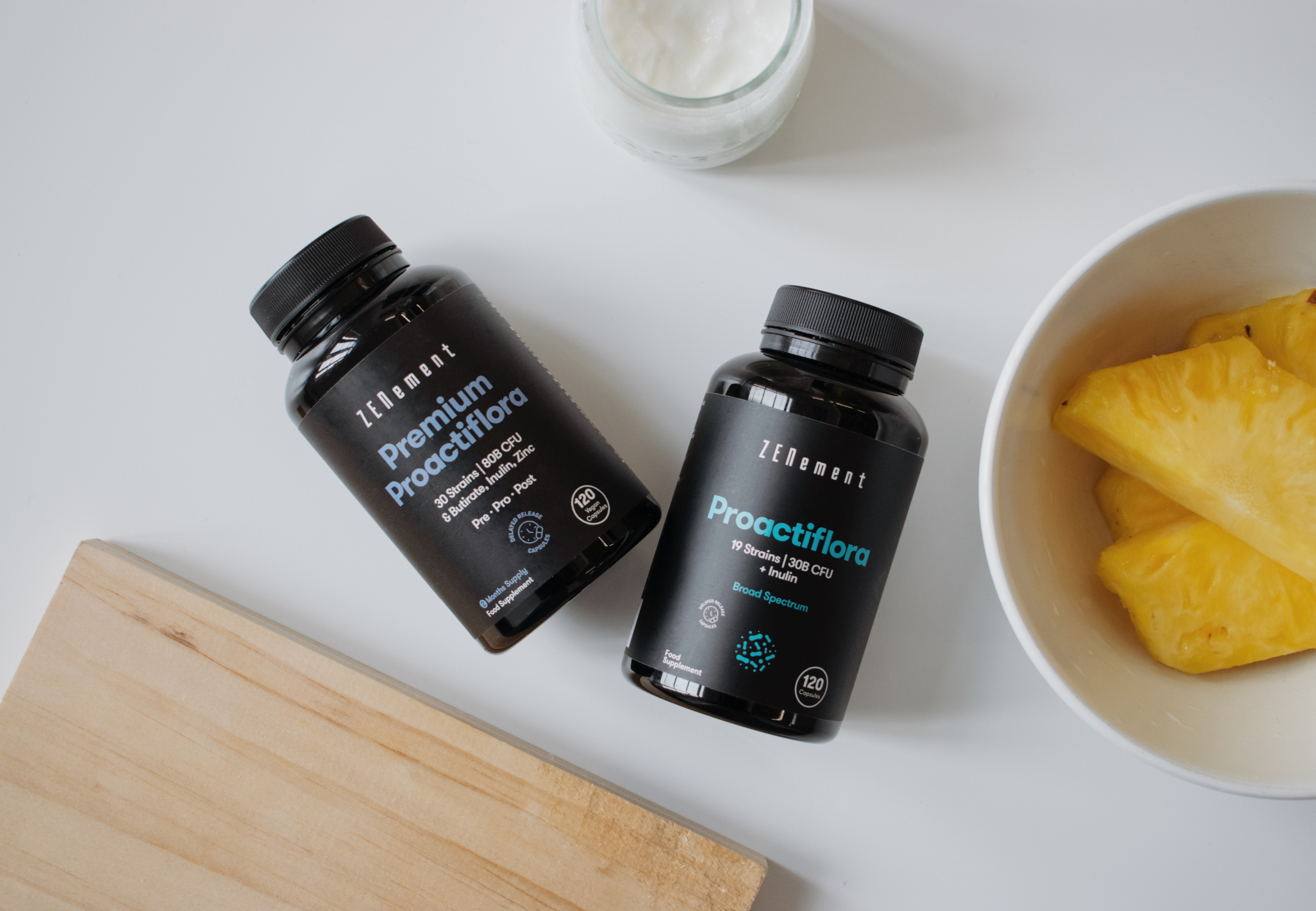The intestinal microbiota, also known as gut flora, is a complex ecosystem of microorganisms that reside in our digestive system. These microorganisms perform essential roles in processes such as digestion, nutrient absorption, and regulating the immune system.
For our microbiota to function optimally, it must keep a balanced and healthy composition. Although there is some individual variability, a microbiota is considered healthy when a diversity of beneficial bacteria predominates and potentially harmful bacteria are in low proportion. Additionally, it is crucial to maintain a balance between the different bacterial species, called strains.
Each person's microbiota has a significant impact on their body's functions. Numerous factors can affect its composition, including dietary patterns, age, stress levels, use of antibiotics, and the presence of specific diseases. This is why the gut flora can be considered a "mirror" of a person's lifestyle.
To strengthen your microbiota's health, you can incorporate probiotics, prebiotics, and postbiotics into your diet or through nutritional supplements. But, what are they?
- Probiotics are live microorganisms that, when ingested in adequate amounts, provide you with healthy benefits.
- Prebiotics are non-digestible dietary fibres (such as inulin) that act as nutrients for beneficial bacteria, promoting their growth.
- Postbiotics are metabolites and other substances produced by probiotics during their activity in the intestine. These include short-chain fatty acids (butyrate, propionate, and acetate) which are recognised for their anti-inflammatory effects, digestive health benefits, and their ability to strengthen the intestinal barrier and immune system.
Below are two dietary supplements that contain probiotics, prebiotics, and postbiotics, which can help improve your digestive health.
Proactiflora, with probiotics and prebiotics
Proactiflora is a supplement that includes probiotics and prebiotics. It contains 19 strains of beneficial bacteria. Additionally, it offers a concentration of 30 billion Colony-Forming Units (CFU), live microorganisms, per dose. It includes inulin as a prebiotic.
Proactiflora capsules are gastro-resistant, meaning they are resistant to stomach acid, ensuring that the microorganisms can reach your intestine intact. They are also delayed-release, they gradually release their contents at the target point, allowing the beneficial strains to colonise optimally.
Premium Proactiflora, with probiotics, prebiotics, and postbiotics
Premium Proactiflora is a symbiotic supplement that combines prebiotics, probiotics, and postbiotics. It contains 30 strains of beneficial bacteria, and provides 80 billion CFU per dose. It features inulin as a prebiotic, butyrate (CoreBiome®) as a postbiotic, and zinc, a mineral that contributes to the proper functioning of the immune system. Premium Proactiflora capsules, like the previous supplement, are gastro-resistant and delayed-release.
Which Probiotic Supplement Should I Use?
Proactiflora and Proactiflora Premium are two supplements that are used to improve gut microbiota health. Below you will find a comparison table comparing both supplements, so you can choose which one is best for you:
Proactiflora and Premium Proactiflora: Similarities and Differences
|
Features |
||
|
Type of supplement |
Probiotic and prebiotic |
Probiotic, prebiotic, and postbiotic |
|
Composition |
Contains 19 strains of beneficial bacteria + Inulin |
Contains 30 strains of beneficial bacteria + Inulin + Butyrate + Zinc |
|
Strength |
30 CFU per dose |
80 CFU per dose |
|
Which is the best for me? |
If you're looking for a basic support for gut health and the immune system |
If you are looking for a more complete support to improve your gut health and strengthen your immune system |
Tips for use
As they are gastro-resistant capsules, they can be taken at any time of the day, on an empty stomach or with food. As the strains are freeze-dried (the water has been removed), they do not need to be refrigerated and can be stored in a cool, dry place.
Strains that compose our supplements
Each strain has a distinctive function in your body. Below is a comparative table of the strains contained in each product:
|
Strains |
Role in the microbiota |
Premium Proactiflora | |
|
Lactobacillus acidophilus |
Improves the overall health of your digestive system. |
X |
X |
|
Bifidobacterium longum |
Balances microbiota, improves gut function, strengthens the barrier, and regulates immune response. |
X |
X |
|
Bifidobacterium lactis |
Supports gut health and immune function. |
X |
X |
|
Lactobacillus plantarum |
Supports intestinal health and improves irritable bowel syndrome. |
X |
X |
|
Lactobacillus rhamnosus |
Helps with gastrointestinal problems. |
X |
X |
|
Bifidobacterium breve |
Improves intestinal function by strengthening the intestinal barrier and regulating the immune system. |
X |
X |
|
Lactobacillus salivarius |
Improves oral health and strengthens the intestinal barrier by inhibiting the growth of harmful bacteria. |
X |
X |
|
Lactobacillus casei |
Supports the immune system and helps relieve diarrhoea. |
X |
X |
|
Lactobacillus paracasei |
Promotes a healthy balance of intestinal microbiota, strengthens the intestinal barrier and the immune system. |
X |
X |
|
Lactobacillus gasseri |
Improves digestion by preventing problems such as bloating and relieves digestive problems such as constipation and diarrhoea. |
X |
X |
|
Enterococcus faecium |
Helps maintain a balanced and healthy microbial population. |
X |
|
|
Lactococcus lactis |
Supports digestion and strengthens the intestinal barrier, therefore contributing to intestinal and immunological health. |
X |
X |
|
Lactobacillus reuteri |
Helps regulate the immune system, improves dental health, and reduces diarrhoea. |
X |
|
|
Lactobacillus brevis |
Benefits intestinal health and immunological function. |
X |
|
|
Lactobacillus helveticus |
Strengthens the intestinal barrier, fights pathogenic bacteria, and enhances immunological response by reducing inflammation. |
X |
|
|
Lactobacillus crispatus |
Protects mucous membranes against disease-causing microorganisms. |
X |
|
|
Lactobacillus fermentum |
Improves digestive system health and immunological function. |
X |
|
|
Bifidobacterium infantis |
Helps reduce irritable bowel syndrome symptoms. |
X |
|
|
Bifidobacterium bifidum |
Benefits intestinal health and may improve immune response. |
X |
|
|
Bifidobacterium animalis |
Helps improve digestion and immune health. |
X |
|
|
Streptococcus thermophilus |
Helps improve digestion, especially in breaking down lactose. |
X |
|
|
Leuconostoc mesenteorides |
Prevents infection due to disease-causing microorganisms. |
X |
|
|
Pedicoccus acidilactici |
Improves intestinal health. |
X |
|
|
Lactobacillus bulgaricus |
Helps improve digestion. |
X |
|
|
Bifidobacterium adolescentis |
Improves intestinal health. |
X |
|
|
Pediococcus pentosaceus |
Improves fermentative processes and intestinal health. |
X |
|
|
Lactobacillus johnsonii |
Supports immune system health. |
X |
|
|
Lactobacillus jensenii |
Protects mucous membranes against disease-causing microorganisms. |
X |
|
|
Lactobacillus sakei |
Antibacterial, as it protects against disease-causing microorganisms. |
X |
|
|
Lactobacillus curvatus |
Regulates appetite and reduces intestinal inflammation. |
X |
|
|
Saccharomyces boulardii |
Helps prevent and treat diarrhoea. |
X |
To conclude, the intake of probiotic, prebiotic, or postbiotic foods or supplements is essential in order to maintain the correct balance of your gut microbiota; this is an effective strategy to reinforce its functions and maintain an optimal level of health.


